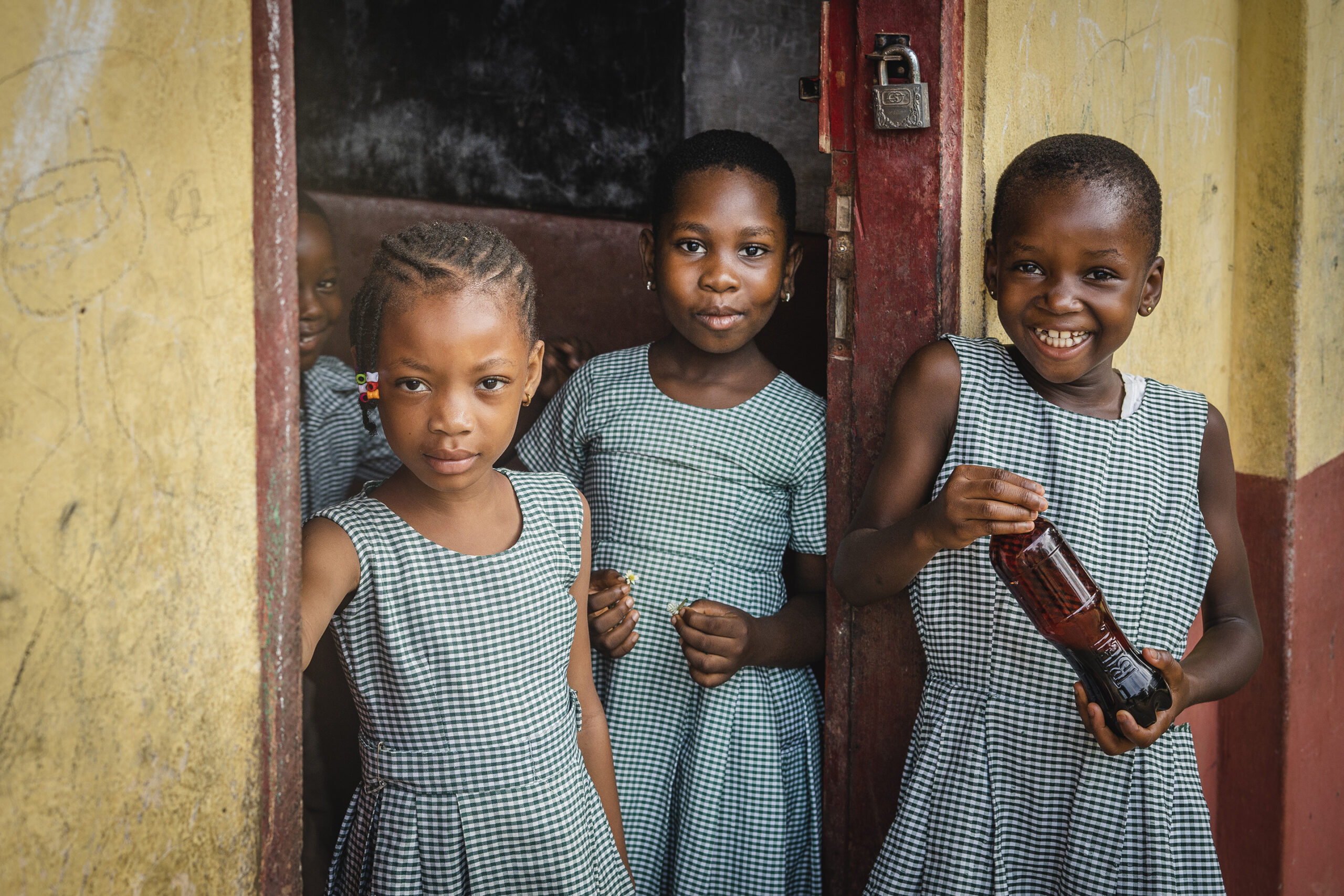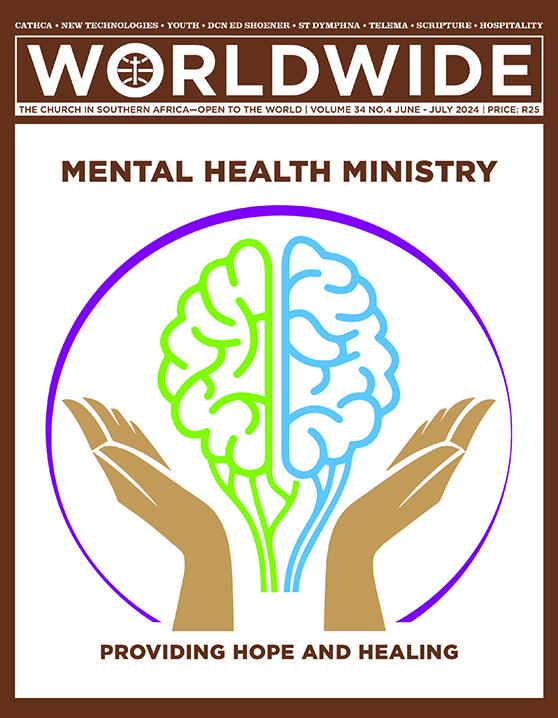
MENTAL HEALTH MINISTRY: PROVIDING HOPE AND HEALING
The colours symbolise peace and nature, the brain represents the mind and the hands imply care—thus giving the impression of ‘the mind in caring hands.’ (Lauren Bikhani, Mental Health Ministry Coordinator at All Saints Catholic Church, Ennerdale, Johannesburg).
Design by Warren Singh from DesignCreed.
FRONTIERS • MENTAL HEALTH CENTRE IN KINSHASA (DRC)
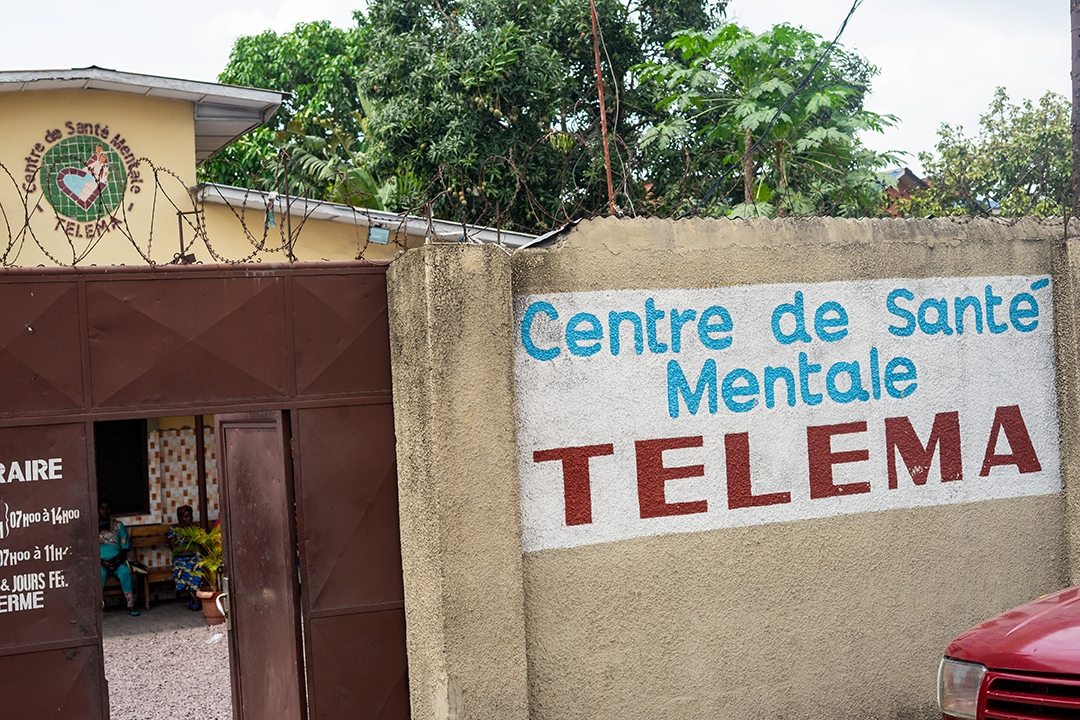
TELEMA: A PLACE FOR THE FORGOTTEN
Myths and superstitions abound in many places, stigmatising mental illnesses which, despite their high incidence, receive a sadly inadequate response from many public health systems. In this context, the Telema Centre in Kinshasa, the Congolese capital, is an oasis of hope for the locals who suffer from mental illnesses.
BY ENRIQUE BAYO MCCJ
MANY MENTALLY ill people wander the streets of Kinshasa. They are easy to spot and identify. They walk alone, half naked, in ragged and dirty clothes, with uncombed hair. They live off people’s charity and depend on alms and are exposed to all kinds of aggression and opportunistic diseases. If their behaviour becomes violent, they may disappear without being missed. In most cases, their families, confronted with the chronic poverty that gnaws at Congolese society, are forced to abandon them because they are unable to take care of them. In addition, the state also neglects its responsibility for their care.
Kinshasa is not an exception in Africa. The problem is found in many other cities on the continent. According to the World Health Organisation (WHO), more than 10 % of Africans suffer from some kind of mental disorder, but the budgets that countries allocate to combat this type of pathology is almost non-existent, and neuropsychiatry services in African hospitals are very rare. The WHO recommends one psychiatrist for every 5 000 inhabitants, but in many sub-Saharan African countries there is barely one for every 100 000 people.
Mental illness includes a wide range of neurological and psychotic pathologies. Neurological pathology affects the central and peripheral nervous systems, and the most common pathology includes dementia, stroke, epilepsy, multiple sclerosis, and migraines. Psychotic disorders, on the other hand, cause a distortion in the perception of reality and are characterised by the appearance of abnormal thoughts, ideas, and perceptions. These disorders include depression, phobias, obsessive-compulsive disorder, schizophrenia, bipolar disorders, etc.
Oasis of hope
To bring hope to the patients of Kinshasa affected by these pathologies, the Sisters’ Hospitallers of the Sacred Heart founded the ‘Telema’ Mental Health Centre— which in Lingala means ‘get up’. The first Hospitallers arrived in Kinshasa in 1989 at the request of the local Church, which felt powerless and wanted to offer a solution to the unprotected mentally ill who roamed the streets of the capital. Two years later, in 1991, the Telema Centre, in the Matete district, was inaugurated.
Everyone has access to care in Telema. No patient leaves without treatment.
This specialised mental health hospital has now outgrown its capacity. More than 50 000 consultations are carried out every year. The corridors and waiting rooms are overcrowded with people waiting their turn to enter one of the five consulting rooms. The main problem they face from the viewpoint of the centre is the general public’s lack of awareness of mental illness issues. Typically, when someone manifests any symptoms of a mental disorder, the family does not consider coming to the hospital as a first option. They often think it is a spell, a matter of witchcraft, and their first visit is to the pastor to pray and free the sick person from the evil spirit. When they eventually get to the hospital, precious time has been lost. For example, an acute psychosis which could be corrected in six months could deteriorate and escalate into an irreversible chronic illness.
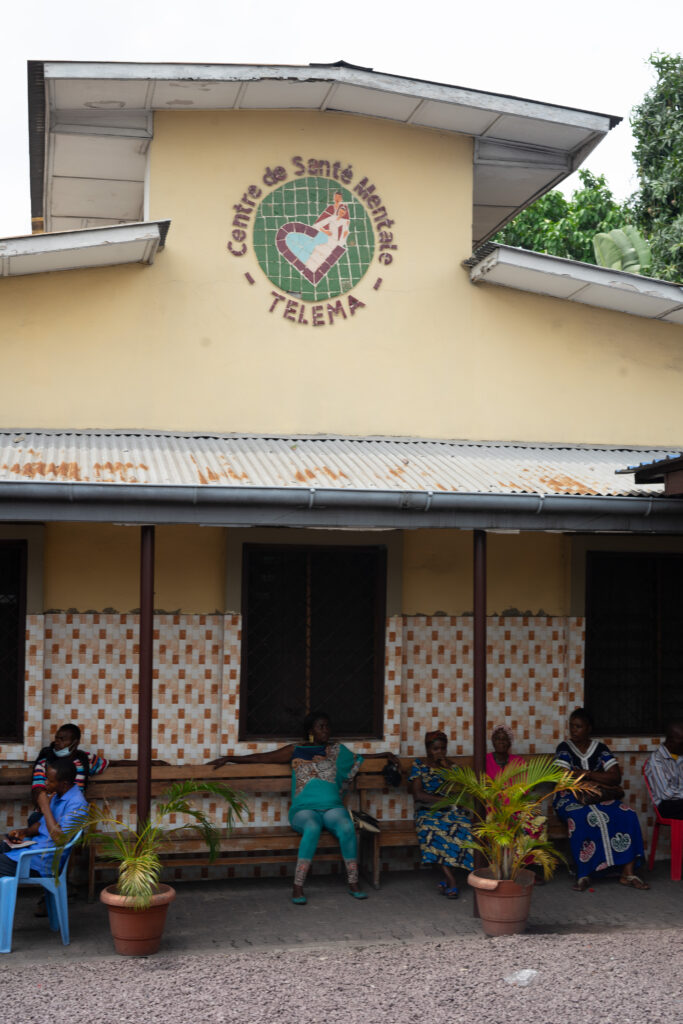
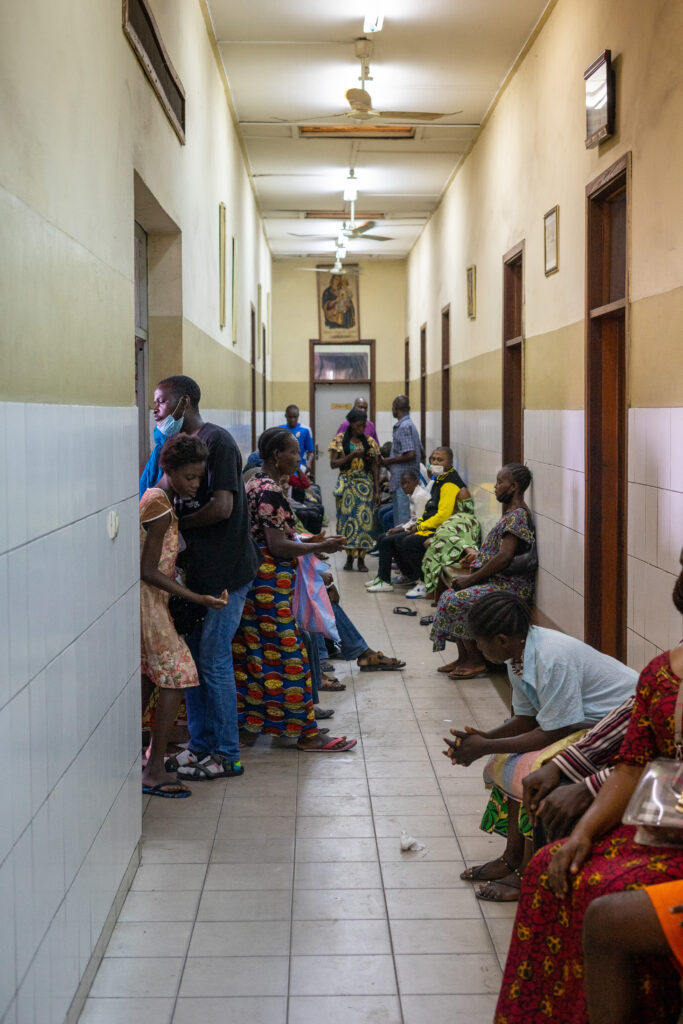
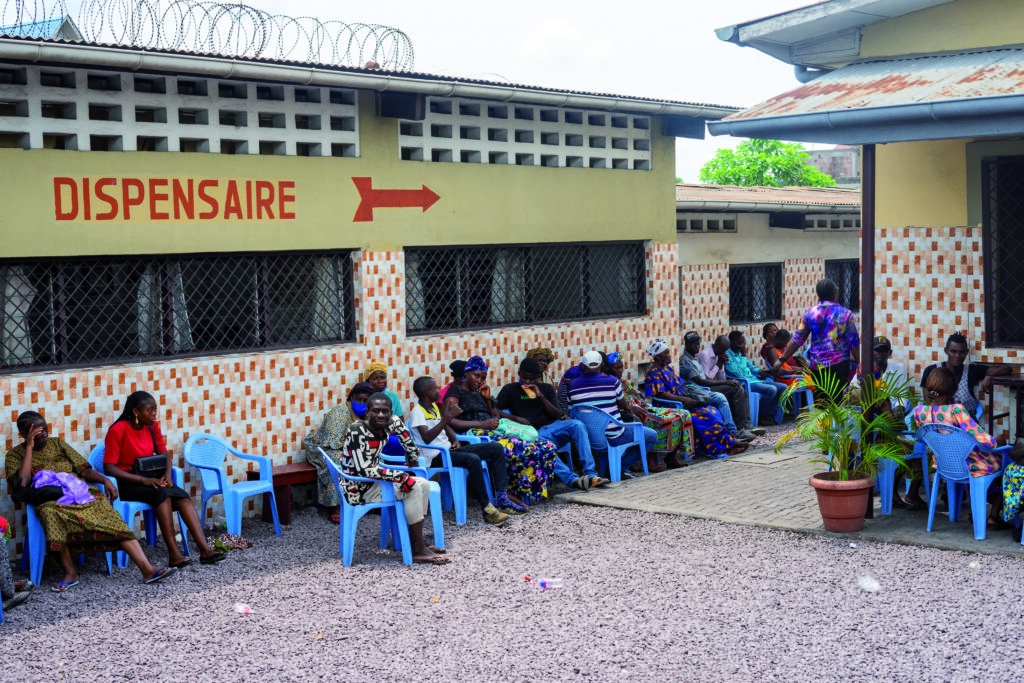
Raising awareness
This finding justifies the centre’s awareness programmes, which include a mental health newsletter, radio programmes, and visits to schools and churches, spreading mental care information among students and parishioners. At Telema, an attempt is made to prevent the marginalisation of the mentally ill by helping people to understand that mental illness is not unlike any other illness, that it has its causes and effective treatments. The Centre never tires of inviting the general public to bring to its doors anyone whoever may show symptoms.
Telema’s mental health programs have a multiplication effect; such as its training sessions for health staff from other medical institutions in the city, through which they provide valuable knowledge of neuropsychiatry.
There are private psychiatric clinics in Kinshasa—only accessible to patients with financial means—as well as the Neuro Psycho-Pathological Centre (NPPC) of the University of Kinshasa, which is currently mostly dormant. This renders the Telema Centre practically the only one in the city that takes care of the mentally ill. Everyone has access to care in Telema, as the consultation fees are very low, and when families cannot afford to pay for medication, the centre provides assistance and helps them. No patient leaves without treatment.
The availability of medicine is precisely the centre’s Achilles’ heel. Medicines for neuropsychiatric pathologies are tightly controlled and not all suppliers are able to import them. Thanks to collaboration with the Bureau Diocésain des Oeuvres Médicales (Diocesan Office of Medical Works) of Kinshasa, the CNPP, several pharmaceutical companies and numerous internal and external benefactors, the Telema pharmacy is able to meet the needs of its large number of patients. However, occasionally, especially during the COVID pandemic, there were supply shortages with obvious negative consequences for the health of some patients whose treatment had to be interrupted.
A house associated with the hospital sisters takes in several women and children with mental disorders on a full-time basis, but Telema’s priority is to avoid isolating the sick in hospitals or institutions, and to work with a community-based approach to help the sick to integrate themselves into society. This involves a lot of work raising awareness among families so that they learn to live with their patients and to take care of them, even though the treatment may be lengthy and require a lot of patience. It is challenging, especially when it is the woman who is ill, because she is all too often expelled from her home and must return to her biological family. This partly explains why women are more affected by the effects of mental disorders. Another striking fact: sick men who come to the centre are often accompanied by their wives, whereas the opposite is very rarely seen.
Staff and training
To ensure its normal functioning, the hospital is staffed by some 25 health professionals, including the hospital sisters. All the staff at Telema have undergone specific training in psychiatry. Even those who work in the occupational workshops have received this type of training. In addition, some form of religious training is required from all staff members. Telema requires its employees to be imbued with the charism and spirit of the institution. Before someone is employed, they are made aware of this condition. It is a prerequisite for employment. As regards the patient: everyone is welcomed unconditionally.
Women are more affected by the effects of mental disorders.
The occupational workshop is situated in one wing of the centre, where around thirty men and women carry out manual sewing, jewellery making, embroidery, and the manufacture of all kinds of products with a double objective: therapeutic and self-financing. The workshop’s star products are its famous rag dolls.
Pioneer
The Neuro Psycho-Pathological Centre of Kinshasa opened in 1973 in the Mont-Amba district and was the first specific mental health care centre in Central Africa. It was built in different phases, with a capacity for 500 inmates and an associated mental illness research centre. For many years it operated smoothly, with patients even arriving from other nearby countries for treatment. The Congolese crisis has however greatly affected this pioneering structure, which now receives hardly any funding. The health workers are paid poorly and the deterioration of the facilities is more than evident due to its lack of maintenance.
Dr Simon Bokongo Lokoso, a neuropsychiatrist at the NPPC, acknowledges that the centre is functioning at barely 10% of its potential. Those who are admitted to the hospital have the financial support of their families or of an association that provides funding. This is the case with soldiers who are hospitalised for mental disorders caused by war trauma or by remorse after killing someone. The army regularly pays for the treatment of these soldiers. Even university professors have an association which supports them.
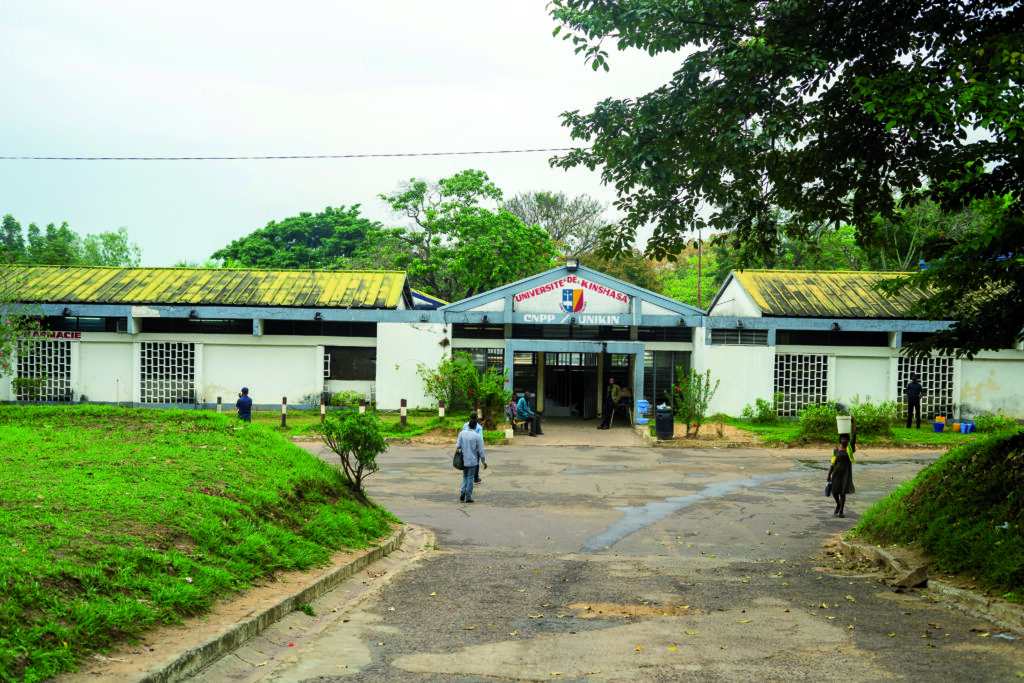
The Telema centre and the NPPC are the only mental health centres in DRC. Their presence is insufficient to cope with the immense challenge of mental illness, as both Kinshasa and all other major Congolese cities remain home to people with a vast number of disorders, who are living on their streets. What would become of the people of Kinshasa without these centres? The situation would be much more dire. Awareness of this gives the sisters and their staff the courage to continue working for the good of the people.

